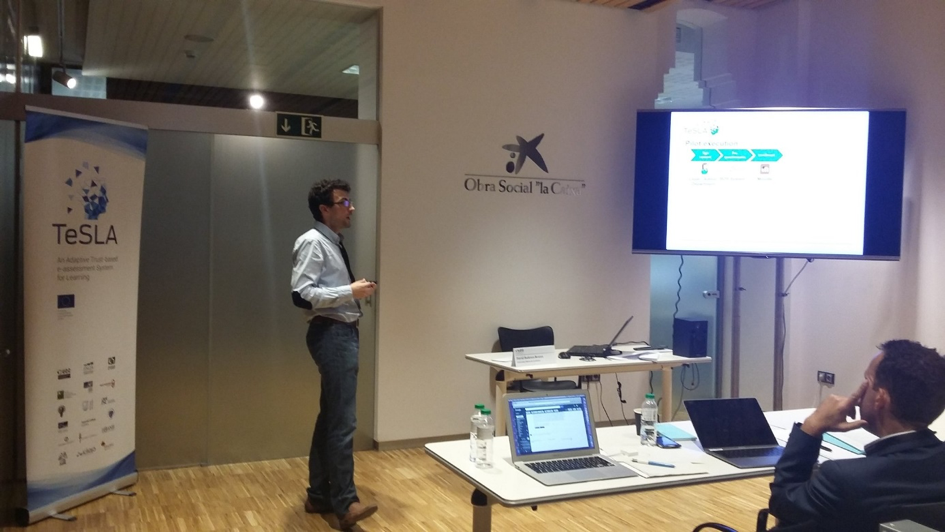


A paper analyzing the results after the first pilot of the TeSLA project performed in Technical University of Sofia (TUS) and Open University of Catalonia (UOC) was presented at the International Technology Enhanced Assessment Conference (TEA Conference) that took place on 5-6 October 2017 in Barcelona, Spain. The TEA conference is a unique forum giving the possibility to researchers, teachers and policymakers to share their understanding, problems and challenges in the area of e-Assessment.
The presented joint work was focused on the gained experience during the first pilot in TUS that is a blended-learning institution and fully online university UOC, showing the similarities and differences in management and organization of e-Assessment process in courses from engineering academic programs. Several problems and solutions were identified and discussed.
For the project purposes, both universities used Moodle LMS with integrated plugins to test the TeSLA instruments for face recognition, voice recognition, keystroke dynamics, forensic analysis and plagiarism.
TUS as a blended learning institution combines the face-to-face exams that are organized in written form with online quizzes, engineering tasks and projects. The decision of TUS was to involve students from four different courses in real assessment activities to test three instruments: face recognition, keystroke dynamics and forensic analysis. UOC as a fully online university performed the pilot with students just from one course, testing the instruments for face recognition, voice recognition, keystroke dynamics and plagiarism. A common strategy for both institutions was the included courses in the first pilot to be led by teachers who participated in the TeSLA project. The students’ characteristics from a demographic point of view were different: in TUS there was a balance between involved female and male students while at UOC there was a low presence of female students. Also, there was a difference in the ages: the enrolled students from TUS were full-time students and the 63 % of them were aged under 22. In UOC the involved students were incorporated into the labour market: the 62 % were aged over 30 and the 75 % of them had a full-time job. Despite all these differences, the achieved final results were better than students’ results who did not participate in the piloting courses. The conclusion was that the usage of the TeSLA system in the e-Assessment process influenced in a positive way to the academic success of the involved students.
According to the identified problems during the first pilot the following main issues were discussed:
1. Trust in e-Assessment – Both institutions had to find the best direction (detailed information in textual and multimedia formats) to explain the TeSLA project to the students and teachers. In other way, they could misunderstand the real objectives and they might feel that their universities do not trust them.2. Students’ motivation – Several strategies had to be incorporated to increase and to keep students’ motivation for pilot participation during enrolment and follow-up assessment activities. 3. Technical – The TeSLA system was not ready and the Moodle instance only served as a temporal platform to conduct the piloted courses. 4. Re-design of e-Assessment activities – The e-Assessment activities had to meet the requirements of used TeSLA instruments and this fact forced to re-design them.5. E-Assessment execution – In order to improve the execution phase and to obtain more data, both institutions that involved fewer courses had to deploy different instruments in different activities in the same course.
This collaborative work contributed to better understanding the e-Assessment process in blended and fully online universities through utilization of the trustworthy system TeSLA and was an interesting topic for the TEA conference revealing the advances of an innovative solution in the area of e-Assessment.
UOC and TUS teams

FUNDED BY THE EUROPEAN UNION
TeSLA is not responsible for any contents linked or referred to from these pages. It does not associate or identify itself with the content of third parties to which it refers via a link. Furthermore TESLA is not liable for any postings or messages published by users of discussion boards, guest books or mailing lists provided on its page. We have no control over the nature, content and availability of any links that may appear on our site. The inclusion of any links does not necessarily imply a recommendation or endorse the views expressed within them.
TeSLA is coordinated by Universitat Oberta de Catalunya (UOC) and funded by the European Commission’s Horizon 2020 ICT Programme. This website reflects the views only of the authors, and the Commission cannot be held responsible for any use which may be made of the information contained therein.